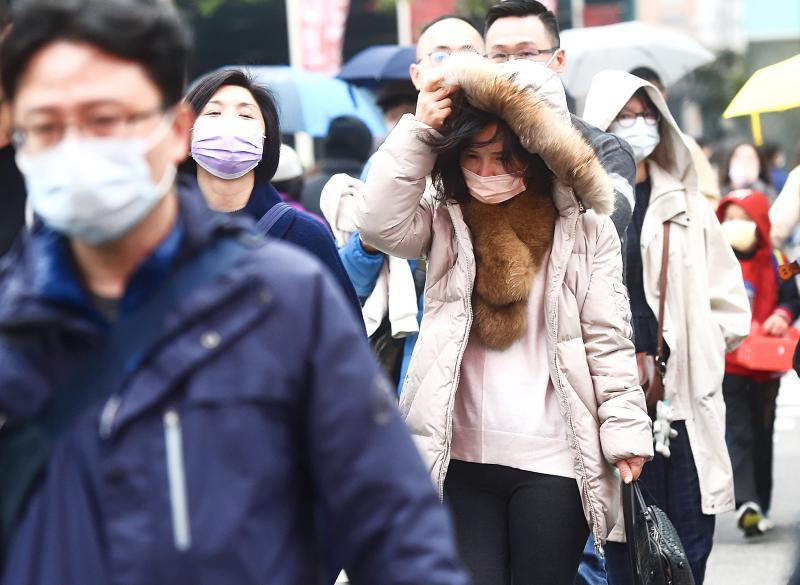The public should be cautious when visiting hot springs or taking hot baths in chilly weather, the Health Promotion Administration said on Friday.
Administration officials said that hot springs are more popular during cold weather, while adding that care must be taken.
People at hot springs should not spend more than 15 minutes in the water and should rise slowly, as blood vessels in hot water expand, causing a drop in blood pressure, which could cause them to faint if they climb out of the water too quickly, the officials said.

Photo: Chien Jung-fong, Taipei Times
People should frequently hydrate before and after they spend time in hot springs, they added.
Those with diabetes, hypertension or hyperlipidemia should be especially careful about the temperature of the water, they said.
People should not go in water that exceeds 40°C, or rapidly switch between hot and cold water, which causes blood vessels to suddenly expand and contract, possibly inducing a heart attack or stroke, the officials said.
People with diabetes can easily be burned, as they are often less sensitive to temperatures due to damaged sensory nerves, they said.
Soaking in hot springs after a meal should be avoided, as alcohol and spicy foods combined with the hot temperature can increase the heart rate, sometimes leading to a heart attack or stroke, they said.
People should seek their doctor’s advice before visiting a hot spring and should never go to a hot spring alone, they added.
The Central Weather Bureau yesterday said that chilly weather is expected throughout Taiwan today and tomorrow, with nighttime temperatures falling considerably from daytime temperatures.
In related news, Da Chien General Hospital vice dean Tsai Chien-tsung (蔡建宗) on Friday said that Miaoli’s Da Chien General Hospital and Wei Kung Hospital admitted 12 people for carbon monoxide poisoning over the past 15 days.
The people were given hyperbaric oxygen therapy and have recovered, the hospitals said.
Carbon monoxide prevents the conjoining of hemoglobin and oxygen, leading to a lower oxygen concentration in the bloodstream, Tsai said.
Those with less severe cases of carbon monoxide poisoning can experience mild vertigo or dizziness, while severe cases can cause nausea and sleepiness, and the most severe cases can lead to a loss of consciousness, he added.
Carbon monoxide is generated when fuel in a machine — such as a vehicle or heater — is not completely burned, said Wu Jen-chuan (吳人權), a physician at Wei Kung Hospital.
The gas is colorless and odorless, leading many to be exposed without realizing it, Wu added.
Additional reporting by CNA

Three batches of banana sauce imported from the Philippines were intercepted at the border after they were found to contain the banned industrial dye Orange G, the Food and Drug Administration (FDA) said yesterday. From today through Sept. 2 next year, all seasoning sauces from the Philippines are to be subject to the FDA’s strictest border inspection, meaning 100 percent testing for illegal dyes before entry is allowed, it said in a statement. Orange G is an industrial coloring agent that is not permitted for food use in Taiwan or internationally, said Cheng Wei-chih (鄭維智), head of the FDA’s Northern Center for

The Chinese military has built landing bridge ships designed to expand its amphibious options for a potential assault on Taiwan, but their combat effectiveness is limited due to their high vulnerability, a defense expert said in an analysis published on Monday. Shen Ming-shih (沈明室), a research fellow at the Institute for National Defense and Security Research, said that the deployment of such vessels as part of the Chinese People’s Liberation Army (PLA) Navy’s East Sea Fleet signals a strong focus on Taiwan. However, the ships are highly vulnerable to precision strikes, which means they could be destroyed before they achieve their intended

LOOKING NORTH: The base would enhance the military’s awareness of activities in the Bashi Channel, which China Coast Guard ships have been frequenting, an expert said The Philippine Navy on Thursday last week inaugurated a forward operating base in the country’s northern most province of Batanes, which at 185km from Taiwan would be strategically important in a military conflict in the Taiwan Strait. The Philippine Daily Inquirer quoted Northern Luzon Command Commander Lieutenant General Fernyl Buca as saying that the base in Mahatao would bolster the country’s northern defenses and response capabilities. The base is also a response to the “irregular presence this month of armed” of China Coast Guard vessels frequenting the Bashi Channel in the Luzon Strait just south of Taiwan, the paper reported, citing a

About 4.2 million tourist arrivals were recorded in the first half of this year, a 10 percent increase from the same period last year, the Tourism Administration said yesterday. The growth continues to be consistent, with the fourth quarter of this year expected to be the peak in Taiwan, the agency said, adding that it plans to promote Taiwan overseas via partnerships and major events. From January to June, 9.14 million international departures were recorded from Taiwan, an 11 percent increase from the same period last year, with 3.3 million headed for Japan, 1.52 million for China and 832,962 to South Korea,